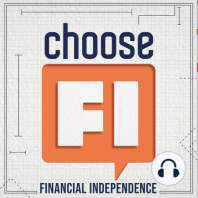22 min listen
312 | First-Time Home Buyer | Bigger Pockets
FromChooseFI
ratings:
Length:
57 minutes
Released:
Apr 12, 2021
Format:
Podcast episode
Description
In 2008-2009, the American dream of a home with a white picket fence turned into a financial nightmare, sending many families underwater for a decade. After looking at the numbers, there’s an ongoing debate over homeownership. Owning may not be the right decision for everyone. Scott Trench and Mindy Jensen from BiggerPockets join the show to discuss home buying and their new book, First-Time Home Buyer: The Complete Playbook to Avoiding Rookie Mistakes. Even if you’ve already purchased a home, Scott and Mindy’s book is a masterclass to help you rework the process during your next home buy. According to their book, “…a smart home purchase will not only give you a place to live, but also offer flexibility, financial stability, and the chance to recognize and increase in that home’s value over time”. Is purchasing a home a good investment? Mindy says, “Maybe”. Housing is an expense whether buying or renting. The more you buy, the more you are spending, and the less wealth you will have. Don’t ask how much can you afford. How little can you spend to meet your lifestyle needs and what’s the best financial decision to meet those needs? There’s a lot of math behind a buying vs. renting decision. As a real estate agent, Mindy tries to stop herself from asking clients how much they can afford. Instead, she asks about the price range, what kind of home they are looking for, and what condition it should be in. Mindy’s home is an investment, but that’s because she buys dumpy homes, fixes them up, and forces the appreciation. However, she says the average person shouldn’t consider their home an investment. For the average buyer, appreciation will generally occur over the course of the ownership time period, but it is the product of the housing market around you. It tends to appreciate 3-8% year over year. Selling after just a few years of ownership won’t make much when you sell, in fact, you may lose money to closing costs. For regular buyers, a home is a place to live, not an investment. Roughly 10% of a property’s purchase price is out the door in closing costs the moment you buy it. If you don’t improve the property and force the appreciation, you have to allow appreciation to carry you back over time. Over a long period of time, the returns on your home are low compared to investment alternatives like the stock market. When deciding to buy or rent, what’s the breakeven point? Scott and Mindy assume a 3.5% appreciation rate, which comes from the Case-Shiller Home Price Index. At that rate, the breakeven point comes in 5-7 years. The higher the appreciation rate, the faster you reach the breakeven point. You don’t need to live in the property for the 5 to 7 years to reach the breakeven point, you only need to own it for that time to make it work. You could rent it after you move out as an exit strategy and increase the desirability of buying. If you rely on a lending calculator to answer the question, “How much house can I afford?”, you’ll end up being house-poor. Median incomes and home prices around the country differ more than other categories, such as food. All the disposable income over what is needed for day-to-day life can go to your scarcest asset, which is housing in many high-cost-of-living areas. There is no rule of thumb for what percentage of income you can spend. It’s about how little house you can buy and eliminate all of the waste. When making the rent vs buy decision, Scott says the biggest variable to consider should be time, then what your appreciation is going to be, what you can do to force the appreciation, and then exit strategies. There can be a dramatic difference between a home you would want to live in and one you could potentially rent. First-time home buyers tend to live in the property, but it’s likely they won’t live there forever and should make the smartest choice by thinking outside their own needs. Mindy suggests using the internet to research what you need versus how can you rent it out. It’s not a sma
Released:
Apr 12, 2021
Format:
Podcast episode
Titles in the series (100)
001 | ChooseFI Podcast: A Finance Podcast for the Middle Class: Introducing a Finance Podcast by FIRE for FIRE In Today’s Podcast we cover: - Welcome to Choose FI’s first podcast from Jonathan Mendonsa and Brad Barrett What the ChooseFI finance podcast is all about: - by ChooseFI
